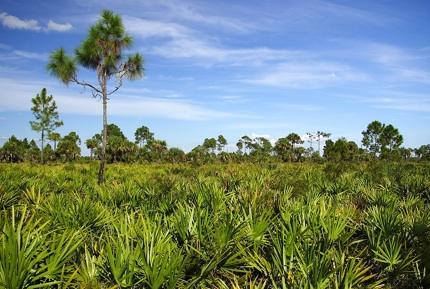Another lawsuit has been filed against the National Park Service over its management plans for a section of Big Cypress National Preserve. The groups contend that the plan would allow too much off-road vehicle use in the area of the preserve known as the "Addition Lands."
Two weeks ago the National Parks Conservation Association filed its lawsuit against the Park Service, saying the agency failed the American public by allowing off-road vehicle use in the 147,000 acres that came into Big Cypress in 1996 as part of a land exchange with the state of Florida.
"We think we have a very strong case of showing that the Park Service has violated numerous laws in a misguided effort to open up the Addition lands to off-road vehicle use," said Robert Rosenbaum, an attorney with the Washington, D.C., firm of Arnold & Porter that filed NPCA's lawsuit. "Normally, the Park Service follows its legal mandates and the scientific and other studies that it has in front of it to guide it to a decision. What we believe happened in this case is that instead the Park Service wanted to open up the Addition to off-road vehicle use, and therefore bent or ignored the legal mandates or the science in order to permit it to reach that decision.”
[url=/2011/10/npca-sues-national-park-service-fish-and-wildlife-service-over-big-cypress-national-preserve-additio8880]
[/url]The lawsuit filed today was brought by a coalition of national and local conservation organizations, including the Sierra Club, the South Florida Wildlands Association, and Public Employees For Environmental Responsiblity.
The filing, like NPCA's was brought in the U.S. District Court for the Middle District of Florida, maintains that widespread motorized traffic allowed for under the preserve's management plan would "degrade the unique natural resources" of the Addition Lands, "create conflict with non-motorized users and fragment one of the last major wilderness areas in the eastern United States."
The Addition Lands have been closed to both ORV use and ORV-assisted hunting ever since they came to the preserve while officials worked on developing a management plan for the area. Of the thousands of species of flora and fauna found in the Addition Lands, nearly 100 plants are listed by the State of Florida as endangered or threatened while 29 animal species have federally protected status.
“These lands are a treasure trove of biodiversity,” said Matthew Schwartz, executive director of the South Florida Wildlands Association.
Species at risk from increased ORV use, he said, include many of Florida’s most iconic species, such as the critically endangered Florida panther (with an estimated 120 remaining in the wild), Cape Sable seaside sparrow, wood stork, red-cockaded woodpecker, Everglades snail kite, eastern indigo snake and the American crocodile.
“They are owned by and are a part of the natural heritage of all Americans. The National Park Service is prioritizing motorized recreation over the protection of an irreplaceable resource here, contrary to both law and its mission," Mr. Schwartz said.
As did the NPCA lawsuit, this one charges the National Park Service, U.S. Fish and Wildlife Service, and the Department of the Interior with violating the Wilderness Act, Endangered Species Act, the Park Service Organic Act and the National Environmental Policy Act, among other authorities. Plaintiffs are the Sierra Club, Public Employees for Environmental Responsibility, South Florida Wildlands Association, Florida Biodiversity Project and Wilderness Watch.
In its own analysis of the “key impacts,” the NPS admits that its decision will likely have adverse impacts on the Addition Lands’ hydrology, soils, vegetation, and several listed species, the groups pointed out. It will also facilitate the spread of invasive and exotic plant species throughout the Addition Lands by disturbing native plants and soils and dispersing seeds, they added. The visitor experience for the current non-motorized users will deteriorate through negative impacts to the natural soundscapes and landscapes, they said.
After announcing in their 2009 Draft General Management Plan for the Addition that approximately 109,000 acres were “wilderness eligible,” the NPS subsequently conducted a “re-assessment” completely outside of public view which suddenly concluded that only 71,000 acres were eligible and recommended just 47,000 acres be proposed to Congress as future wilderness. The effect of this quick re-assessment would allow much of the Addition to be fragmented by a network of off-road vehicle trails.
“This suit is necessary because the Park Service improperly rewrote wilderness mapping to produce a result which had been decided behind closed doors,” said Jeff Ruch of PEER. “We expected better of the Park Service under this administration and, thus far, we have been sorely disappointed.”
“This decision is politically, legally and environmentally unsustainable,” said Sierra Club representative Bradley Stark, pointing out that the overwhelming majority of the public comments received on the project urged the Obama administration to minimize resource degradation and instead preserve the historical and non-damaging recreational uses enjoyed by the public.
“It needlessly alienates a large number of Floridians who seek to enjoy the Addition Lands for bird watching, hiking, and other purposes consistent with the Park Service’s mandate to protect the treasured resources of the Addition Lands, he said. "This is one of the last pieces of South Florida a parent could show to their child and say, ‘This is what our home looked like before settlers arrived over a hundred years ago.’ ”


 Support Essential Coverage of Essential Places
Support Essential Coverage of Essential Places






